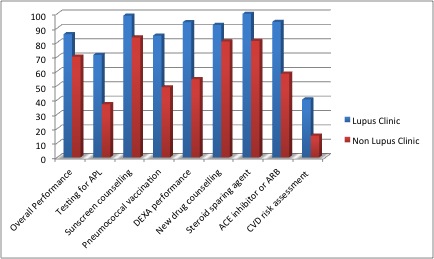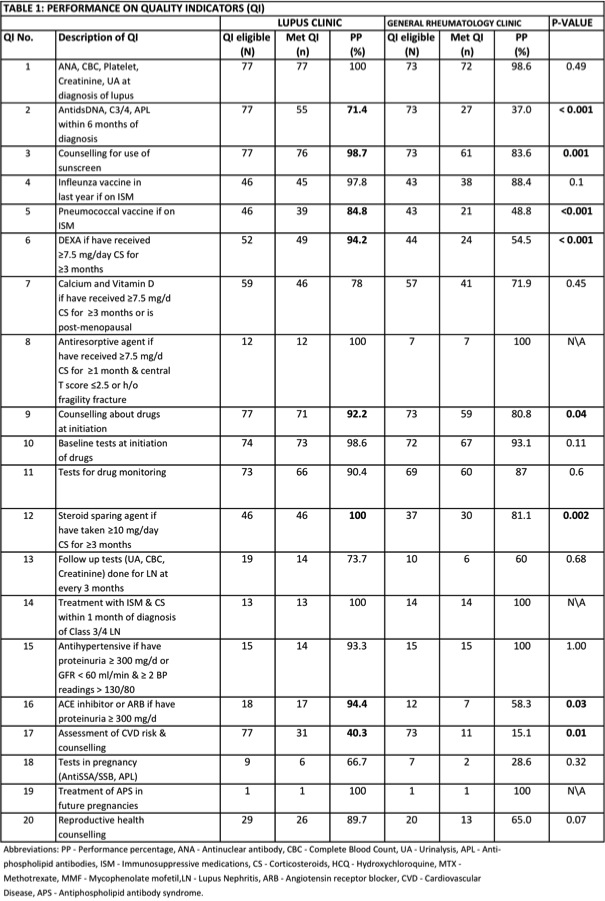Session Information
Session Type: ACR Poster Session B
Session Time: 9:00AM-11:00AM
Background/Purpose: We compared the quality of care received by SLE patients at two settings within the same academic institution (lupus clinic or general rheumatology clinic) using validated SLE quality indicators (QI).
Methods: 150 consenting, consecutive patients fulfilling the ACR classification criteria for SLE receiving longitudinal care at Rush University Rheumatology outpatient clinic and subspecialty Lupus clinic were recruited. A validated QI survey was updated, modified and administered during participantsÕ routine visit. Retrospective rheumatology medical chart reviews were done for complete evaluation of performance on each QI. The overall performance rate (total number of QIs met by total number of QIs that the participants were eligible for) and performance on 20 QIs were calculated for the two groups and compared using non-parametric tests. P-value <0.05 was considered significant.
Results: 77 patients from sub-specialty lupus clinic and 73 patients from general rheumatology clinic participated. Patients receiving care at lupus clinic had longer disease duration [9.8 ± 7.1 vs. 7.0 ± 7.2 years; P= 0.02] and met more number of ACR criteria [5.3 ± 1.6 vs. 4.6 ± 1.0; P= 0.001] compared to patients from general rheumatology clinics. The overall performance rate was significantly greater among lupus clinic SLE patients [85.8% (IQR: 19.6%) vs. 70.2% (IQR: 11.5%), P= 0.001]. Differences noted among the two groups were in counseling for use of sunscreen (98.7% vs. 83.6%, p=0.001), testing for antiphospholipid antibodies (71.4% vs. 37%, p< 0.001), recommendation for pneumococcal vaccine if on immunosuppressive medication/s (84.8% vs. 48.8%, p< 0.001), bone mineral density test performance (94.2% vs. 54.5%, p<0.001), counselling about drugs (92.2% vs. 80.8%, p=0.04), prescribing a steroid sparing agent and angiotensin-converting enzyme (ACE) inhibitor if eligible(100% vs. 82%, p< 0.007 and 94.4% vs. 58.3%, p=0.03, respectively) and assessment of cardiovascular disease risk (40.3% vs. 15.1%, p=0.01) (Figure 1; Table 1). Patients from lupus clinic were less often on corticosteroids as compared to patients from general rheumatology clinic (32.5% vs. 47.9%, p=0.05).
Conclusion: SLE patients seen in the dedicated lupus clinic had better overall and specific QI performance relative to general rheumatology clinics. This may suggest greater recognition among lupus clinic physicians of the importance of preventive care and disease monitoring among SLE patients. Figure 1: Differences in performance of QIs between Lupus clinic and General Rheumatology clinic (p-value <0.05) 
To cite this abstract in AMA style:
Arora S, Nika A, Block J, Sequeira W, Yazdany J, Trupin L, Jolly M. Does SLE Care in a Lupus Clinic Result in Higher Quality Scores Than in General Rheumatology Clinics? [abstract]. Arthritis Rheumatol. 2016; 68 (suppl 10). https://acrabstracts.org/abstract/does-sle-care-in-a-lupus-clinic-result-in-higher-quality-scores-than-in-general-rheumatology-clinics/. Accessed .« Back to 2016 ACR/ARHP Annual Meeting
ACR Meeting Abstracts - https://acrabstracts.org/abstract/does-sle-care-in-a-lupus-clinic-result-in-higher-quality-scores-than-in-general-rheumatology-clinics/

